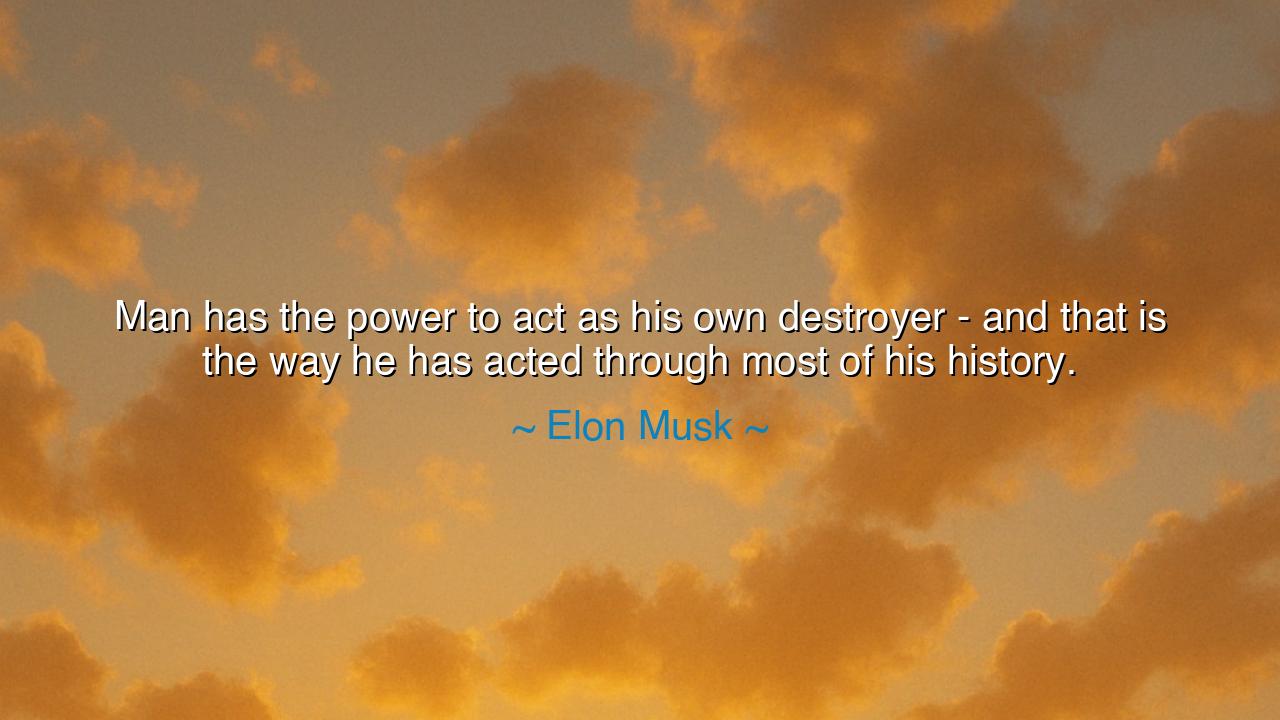
Man has the power to act as his own destroyer - and that is the
Man has the power to act as his own destroyer - and that is the way he has acted through most of his history.






“Man has the power to act as his own destroyer—and that is the way he has acted through most of his history.” So speaks Elon Musk, a prophet of the modern age, whose words echo with the gravity of ancient warnings. These are not the idle musings of a thinker, but the lament of one who has seen both the glory and the ruin that mankind carries within himself. In these words lies the dual truth of human nature: that we are at once creator and destroyer, builder and breaker, the maker of gods and the author of our own fall. It is a truth as old as the fire Prometheus gave, as sharp as the sword that once gleamed in Eden’s dawn.
From the beginning, man has held dominion over creation, not by strength of body but by the might of thought. Fire bowed before his will; the beasts became his servants; the seas bent to his ships. Yet, for every temple he raised, he burned another to ashes. For every law he wrote, he forged a weapon in secret. The same hands that carve the statue also craft the spear. And so Musk’s words rise from this ancient rhythm—the endless cycle of ascent and fall, invention and destruction—that marks the tale of humankind. We have the power to destroy ourselves, and too often we have chosen to use it.
Think of Rome, that mighty empire whose legions conquered the known world, whose engineers built aqueducts that defied time. For centuries, Rome stood as the symbol of civilization itself—order, law, and strength. But in the end, it was not the barbarian who first conquered Rome—it was Rome that rotted from within. Greed replaced honor, indulgence devoured discipline, and the Senate that once ruled the earth became a stage for vanity and corruption. Rome’s fall was not merely an event of swords and sieges; it was the slow suicide of a people who had lost sight of their purpose. Truly, man acted as his own destroyer, and history merely followed his hand.
The same truth burns in our own age, though clothed in new garments. Today we wield powers the ancients could only dream of—the atom, the algorithm, the machine. We command energies that can light the world or shatter it. Yet our wisdom has not grown in equal measure. We build weapons that could erase nations, and machines that could outthink us, all while our hearts remain untamed by virtue. Musk’s words come as a warning to the future: if man continues to invent without reflection, to advance without reverence, then the instruments of progress will become the instruments of ruin. The destroyer now builds his own gods in metal and code.
But the power to destroy also implies the power to choose creation. In every age there are those who stand against the tide—souls who see the abyss and turn away from it. Recall the tale of Oppenheimer, who gave mankind the fire of the atom, only to witness its dreadful use at Hiroshima. His sorrow became a mirror to the conscience of humanity. Yet from that same knowledge arose medicine, energy, and discovery. Even in ruin, the seed of redemption lies waiting. For the mind that can destroy the world can also save it, if it learns to master itself.
Thus the meaning of Musk’s warning is not despair, but awakening. He speaks not to condemn man, but to remind him of his divine power—the freedom to choose his destiny. The destroyer and the savior dwell within the same heart. The hand that presses the button can also plant the seed. What separates the two is not power, but wisdom. It is the discipline to restrain, the courage to reflect, and the humility to serve something greater than desire.
Let this be the lesson for all who hear: know your power, and fear it—but never flee from it. For fear without understanding breeds weakness, and power without reverence breeds ruin. Seek balance between mind and soul; let knowledge be your servant, not your master. Study the past, for every age of destruction was born from the arrogance of those who forgot they were mortal. Build not only with your hands, but with your conscience. Let every creation serve life, not vanity.
In the end, Musk’s words remind us that we stand forever upon a knife’s edge between creation and destruction. The fate of the world has never been in the stars—it has always been in the choices of men. Each day, we stand at the forge of destiny, hammer in hand. And it is there, in the quiet fire of decision, that we must decide whether we shall rise as creators of light—or fall again as our own destroyers.






AAdministratorAdministrator
Welcome, honored guests. Please leave a comment, we will respond soon